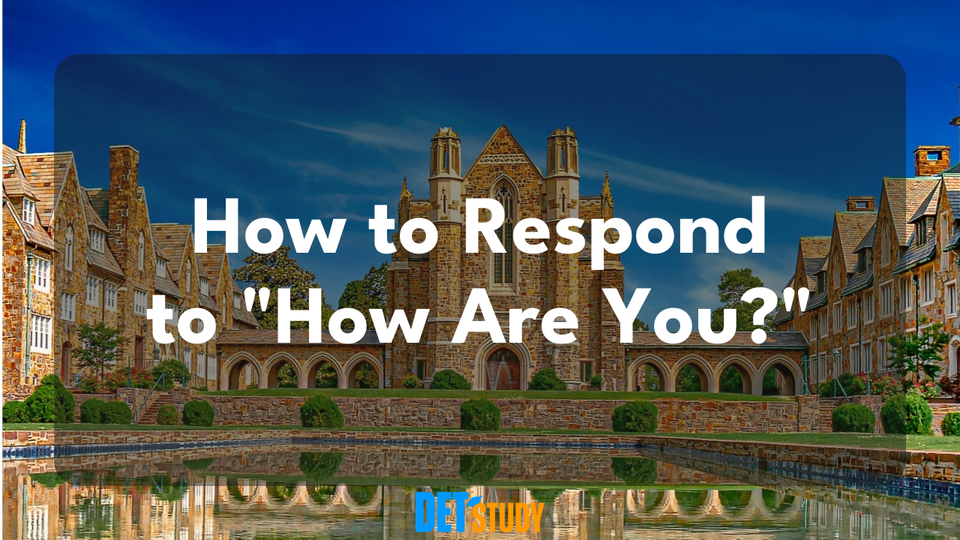Correct Answer to How Are You: Navigating Common English Responses for Effective Communication

When someone asks "How are you?", it's a common part of polite conversation in English. Understanding how to respond can help you engage more naturally in daily interactions. Here are some typical responses and what they imply:
-
"I'm good, thank you." - This is a positive and polite reply. It means everything is fine, and you appreciate the person's inquiry.
-
"I'm fine, thank you." - Similar to "I'm good," this response is neutral and often used when you don't wish to share more details.
-
"I'm doing well, how about you?" - This reply indicates that you are doing fine and encourages the other person to share how they are feeling, fostering conversation.
-
"Not too bad, thanks." - A casual response that suggests things are generally okay. It's slightly less positive than "good" or "fine."
-
"Could be better." - This response hints that things are not going perfectly, but it's often said in a light-hearted manner, not meant to invite a detailed discussion.
-
"I'm alright, just getting by." - Suggests that you're managing, even if things may be a bit challenging. It can be an opportunity for the other person to inquire further if they wish.
-
"I'm feeling great, thank you!" - A very positive response that indicates enthusiasm and happiness. It often brings an upbeat tone to the conversation.
-
"I'm a bit under the weather, but thanks for asking." - Indicates you're not feeling well, usually due to minor illness, like a cold. It's polite and informative.
-
"I'm okay, thanks." - A simple, straight-to-the-point answer that's neutral and polite. It often signifies that there's nothing significant to report.
-
"Not great, but I'll be alright."
- Suggests that things aren't going perfectly but you're staying optimistic. It can invite empathy or support.
By understanding these common responses, you can better navigate social interactions and choose the reply that best fits how you feel and what you’re comfortable sharing.
Formal Responses for Professional Settings
In professional settings, it's important to respond to "How are you?" in a manner that is polite and appropriate. Here are some suitable responses you can use:
-
I'm doing well, thank you. How about you? - This response is courteous and reflects positivity. It also shows interest in the other's well-being by prompting them to share.
-
I'm fine, thank you for asking. How can I assist you today? - This response not only answers the question but also indicates a willingness to help, which is ideal in customer service or business interactions.
-
Thank you for asking, I'm doing well. And yourself? - This option is both polite and succinct, maintaining a professional tone while encouraging reciprocal conversation.
-
I'm quite well, thank you. Is there something you need assistance with today? - By offering help immediately after responding, this answer is efficient in a busy professional environment.
-
I'm doing well, thank you. How is your day going so far? - This response is friendly and aims to build rapport by asking about the other person's experience.
-
I'm great, thank you. Please let me know if there's anything you need. - Expresses readiness to help, keeping the tone helpful and professional.
-
I'm well, thanks for asking. How can I be of service to you today? - This answer conveys professionalism and a service-oriented attitude, suitable for client or colleague interactions.
These responses are versatile and can help maintain a professional demeanor while participating in workplace conversations.
Using Your Smartphone as a Second Camera for the Duolingo English TestCasual Responses for Social Interactions
When someone asks, "How are you?" in a casual or social setting, they are often just being polite or starting a conversation. Here are some ways you can respond in a relaxed and informal context:
- Short and Positive Responses
These are simple and friendly replies that work well in most social situations.
- "I'm good, thanks! How about you?"
- "Doing well, thank you. And you?"
- "Pretty good, how's everything with you?"
- Neutral and Honest Responses
Sometimes, you might not feel particularly good or bad. Here are some neutral responses:
- "Not bad, thanks. What's new with you?"
- "I'm okay, thanks for asking. How are you?"
- "Can't complain. How's your day going?"
- Casual and Brief Responses
These are quick and easy, suitable for when you're in a hurry or when the question is part of passing small talk:
- "Fine, thanks!"
- "Not much going on, you?"
- "Alright, you?"
- Upbeat and Positive Responses
If you're in a great mood and want to express it, here are some cheerful options:
- "Fantastic, thanks! How about yourself?"
- "Couldn't be better! What about you?"
- "Great, just enjoying the day. And you?"
- Humorous Responses
A little humor can lighten the mood. Be careful, though—humor can be subjective, and not everyone might understand it.
- "Living the dream! And you?"
- "Still breathing, so that’s a win! How's it going with you?"
- "If I were any better, I'd be twins! How about you?"
These casual responses can help maintain the flow of conversation and keep things friendly. Remember, the key is to match the tone and context of the interaction.
When someone asks, "How are you?" the default response might be "I'm fine, thank you." However, there are many other ways to express your feelings more accurately. Let’s explore some alternatives.
Feeling Great
-
"I'm doing well, thank you!"
Use this when you're feeling positive and everything is going smoothly. -
"I'm fantastic!"
This is a great response when you want to express that you're feeling particularly wonderful. -
"I'm on top of the world!"
Use this when something extraordinary has happened and you feel extremely happy.
Just Okay
-
"I'm okay."
This is a neutral response indicating that you’re neither particularly good nor bad. -
"I'm getting by."
Useful for when things are not perfect but manageable. -
"Not too bad."
A casual way to say you're doing alright, despite maybe not being perfect.
Not So Great
-
"I've been better."
This signals that you're not at your best, without going into detail. -
"I'm a bit down today."
A gentle way to indicate you're feeling a little low. -
"I'm struggling a little."
This is a more honest response that hints at some challenges you're facing.
Inviting Further Conversation
Sometimes, you might want to open the door for more conversation:
-
"I'm doing well, how about you?"
A reciprocal question that shows you're interested in the other person's well-being too. -
"I've had a few ups and downs. Want to hear more?"
This encourages a deeper conversation if the other person is interested.
Learning to express genuine emotions not only enriches your communication skills but also helps build stronger connections with others. Try using these different responses to convey your true feelings next time someone asks how you are!
Cultural Nuances in Responding
Understanding how to respond to the question "How are you?" requires recognizing the cultural context in which it is asked. In English-speaking countries, this question often functions more as a greeting than a genuine inquiry into your emotional or physical state. Let's explore this cultural nuance further:

Context is Key
In casual, everyday interactions such as meeting someone on the street, in a store, or at work, "How are you?" is typically meant as a greeting. In these situations, a brief and positive response is customary. Common replies include:
- "I'm good, thanks. How are you?"
- "Doing well, thank you!"
- "Great, and you?"
These responses are often expected to be polite and upbeat, reflecting a positive attitude even if your day hasn't been entirely positive.
Be Mindful of Form
When someone asks, "How are you?" the underlying expectation is usually for a short and simple answer. In casual conversations, responding in too much detail about your day or any problems might be unexpected unless the person is a close friend or family member. For example:
- "I'm fine, thanks."
This response works well in most casual settings.
Best Writing Strategies for the Duolingo English TestFormal or Professional Settings
In more formal or professional environments, your response might be slightly more reserved and less personal. Common responses can include:
- "I'm well, thank you. How about yourself?"
- "I'm doing well, thanks for asking."
These responses maintain a professional tone and invite the other person to share how they are doing, which can help foster a positive interaction.
Genuine Inquiries
There are situations when someone genuinely wants to know how you’re doing, such as close friends or family members displaying genuine concern. In these cases, feel free to provide more detail if you feel comfortable:
- "I’ve been a bit stressed with work, but I'm managing. How are things with you?"
- "It's been a hectic week, but I'm doing alright. Thanks for asking."
Understanding when someone is genuinely interested in your well-being versus when they are making polite conversation is crucial for responding appropriately.
Check Your English LevelRegional Differences
Be aware of regional differences even within English-speaking countries. In some cultures, people are more open to sharing personal details, whereas in others, brevity and formality might still prevail despite a closer relationship. Observing and adapting to these nuances will help you respond appropriately.
By considering these cultural nuances, you can navigate the slippery social terrain of responding to "How are you?" with confidence and tact.
DET Study provides an extensive suite of over 15,000 practice questions, focusing on leveraging adjectives and adverbs to fortify your grammatical skills. Regular practice with these targeted materials ensures that you approach the Duolingo English Test with enhanced confidence and precision, ready to achieve your desired scores.
🎯 Need more practice? Check out DETStudy.com for expert resources, 15,000+ practice questions, and AI-powered writing and speaking feedback.
Frequently Asked Questions (FAQ)
What are some common responses to "How are you?"
Can I give a more detailed answer to "How are you?"
Is it necessary to ask "How are you?" back?

